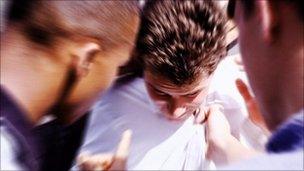Stats show 1,800 attacked in school ahead of new powers
- Published

New powers on school discipline come into force on 31 October
More than 1,800 pupils in Wales were injured in attacks while at school in the last year, figures reveal.
A BBC investigation shows more than 9,000 primary and secondary pupils have been victims of violence since 2005.
As well as cases of so-called 'happy slapping' - attacks filmed on phones - incidents included head injuries, hair being set alight and chemical assault.
New powers to search students for weapons without consent come into force this month.
Emma Jane Cross, CEO of anti-bullying charity Beatbullying, said there was a "clear link" between bullying behaviour and more serious, violent, anti-social behaviour and crimes.
"The new coalition government needs to understand that intervention to tackle child-on-child violence, an extreme form of bullying, is essential," she said.
"There is a clear continuum; what starts out as name calling, excluding people from groups, intimidation or petty theft, can, left unchecked, escalate into more serious violent behaviour such as knife crime and gang-related behaviour."
The number of attacks on pupils taking place on school premises has stayed fairly steady since 2005.
The statistics were collated after all local authorities in Wales were asked via a freedom of information request to reveal details about recorded assaults between the 2005-2006 school year and 2009-2010.
Of the councils asked, 13 were able to provide the required data, which suggests the true figure for assaults in schools could be higher.
Of the councils which did respond, Cardiff and Caerphilly experienced the most incidents of violence over the period while Powys and Pembrokeshire experienced the fewest.
The figures included primary, secondary and special schools.
Not all authorities broke down the assaults into categories, but those that did revealed some incidents including:
pupil hit over head with rock, causing scalp cuts
eight-year-old kicking another in head
15-year-old cutting two classmates with pencil sharpener blade
15-year-old setting fire to girl's hair
pupil squirting cleaning fluid in another's eye
11-year-old threatening other children with scissors
pupil hitting peer in the face with chair, requiring stitches
student knocked out in a fight that broke out in a changing room after football match
child cut with a craft knife
pupil's eye deliberately burnt with laser pen
student heating up pen and forcefully placing it on another child's neck
child attacking another with chisel
secondary school pupil stealing diabetic child's needle and poking other children with it
primary school pupil holding plastic bag over child's head
The Welsh Assembly Government said: "We do not tolerate violence and aggression in schools and colleges.
"It is important that schools and colleges are safe places to be to ensure the best possible educational environment for our young people and protect staff."
On Monday the Education Minister, Leighton Andrews, signed an order meaning the powers for schools and colleges to search pupils for weapons without their consent will come into effect in Wales on 31 October.
The spokesperson added: "At the same time we shall be commencing new powers and duties for school discipline, parental responsibility and exclusion.
Broken bones
"These will be supported by revised guidance, including comprehensive guidance on the use of reasonable force to control or restrain pupils.
"All these developments sit within the wider context of the implementation of our Behaving and Attending Action Plan, and show how determined we are to stamp out all forms of violence from our schools."
The investigation follows on from another the BBC published on Thursday, revealing that in the same time frame nearly 4,000 staff were subjected to abuse, with some suffering broken bones.
An NSPCC spokesperson said: "No child or young person should face violence, the threat of violence or bullying as part of their day-to-day life. Unfortunately, for many children in Wales, this is a daily occurrence - whether at school, at home or in their local community."
The charity added that over the last 10 years, bullying has consistently been one of the main reasons for children to contact ChildLine, making up 14% of all calls to the helpline in 2009/10.
- Published7 October 2010